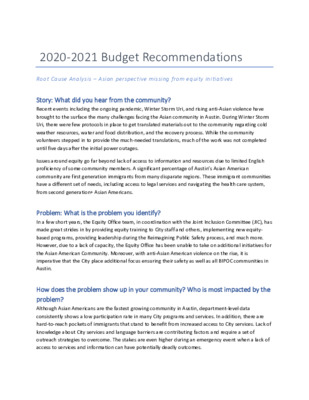Agenda Item 4d_FY2022 Budget Recommendation — original pdf
Backup

2020‐2021 Budget Recommendations Root Cause Analysis – Asian perspective missing from equity initiatives Story: What did you hear from the community? Recent events including the ongoing pandemic, Winter Storm Uri, and rising anti‐Asian violence have brought to the surface the many challenges facing the Asian community in Austin. During Winter Storm Uri, there were few protocols in place to get translated materials out to the community regarding cold weather resources, water and food distribution, and the recovery process. While the community volunteers stepped in to provide the much‐needed translations, much of the work was not completed until five days after the initial power outages. Issues around equity go far beyond lack of access to information and resources due to limited English proficiency of some community members. A significant percentage of Austin’s Asian American community are first generation immigrants from many disparate regions. These immigrant communities have a different set of needs, including access to legal services and navigating the health care system, from second generation+ Asian Americans. Problem: What is the problem you identify? In a few short years, the Equity Office team, in coordination with the Joint Inclusion Committee (JIC), has made great strides in by providing equity training to City staff and others, implementing new equity‐ based programs, providing leadership during the Reimagining Public Safety process, and much more. However, due to a lack of capacity, the Equity Office has been unable to take on additional initiatives for the Asian American Community. Moreover, with anti‐Asian American violence on the rise, it is imperative that the City place additional focus ensuring their safety as well as all BIPOC communities in Austin. How does the problem show up in your community? Who is most impacted by the problem? Although Asian Americans are the fastest growing community in Austin, department‐level data consistently shows a low participation rate in many City programs and services. In addition, there are hard‐to‐reach pockets of immigrants that stand to benefit from increased access to City services. Lack of knowledge about City services and language barriers are contributing factors and require a set of outreach strategies to overcome. The stakes are even higher during an emergency event when a lack of access to services and information can have potentially deadly outcomes. Members of Austin’s Asian American community are also concerned about rising anti‐Asian hate. Asian American community leaders have called upon the City to track these types of incidences and provide services such as bystander training. Considering all the information you have or have not collected above, how do we solve for this problem? The AAQoL Advisory Commission recommends that the City fund an additional staff position in the Equity Office to serve Austin’s Black, Indigenous, and people of color (BIPOC) communities, including the Asian American and immigrant communities. Additional capacity in the Equity Office could be used to raise performance measures of Asian Americans served by Equity Office and other City department programs. In addition, the expanded capacity could direct more resources to diverse Asian American immigrant groups, which have distinctly different immigration histories, disparities, and needs from second generation+ Asian Americans. With additional capacity, the Equity Office will be able to undertake new and expanded initiatives that support the Asian American community and overlap with priorities of other commissions, such as the Commission on Immigrant Affairs and the Hispanic/Latino Quality of Life Resource Advisory Commission. These initiatives include, but are not limited to, the following: Naturalization Program: Support eligible residents cover the costs of their naturalization program and help prepare applicants for their exam Deferred Action for Childhood Arrivals (DACA) Support: Development of a program to support eligible residents with paying for their DACA application and partner with local groups to host DACA clinics Immigrant Affairs Office: Assist with building out the newly established Office of Immigrant Affairs Immigrant Integration Mini‐Grant: Continue building out a pilot program intended to fund innovative, community‐based initiatives that help remove structural barriers for various immigrant communities, including Asian immigrant communities, and help create an environment that is more inclusive and welcoming